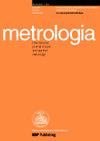稳定性和不确定性均低于 5×10-18 的锶晶格时钟
IF 2.4
3区 工程技术
Q2 INSTRUMENTS & INSTRUMENTATION
引用次数: 0
摘要
我们报告了基于 87Sr 原子的光晶格时钟实现闭环运行的情况。我们使用空腔稳定的 698 nm 激光来探测困在光学晶格中的锶原子的 1S0→3P0 时钟转变。我们从中获得了线宽为 0.6 Hz 的傅立叶限幅拉比光谱。从 mF=±9/2 基态开始的两个跃迁被交替询问,以实现时钟的闭环运行,时钟激光被稳频到两个跃迁的中心。在交错测量的基础上,对单个光学时钟的频率不稳定性进行了迪克效应优化,证明其频率不稳定性为 4.5×10-16/τ,τ 为测量的平均时间。此外,我们还建立了另一个类似的锶晶格时钟装置,用于两个时钟之间的异步比较,在 47 000 s 时测得的稳定性为 2.1×10-18。此外,我们还仔细校准了 Sr1 光学时钟的系统效应,总的不确定性被评估为 4.4×10-18 。本文章由计算机程序翻译,如有差异,请以英文原文为准。
A strontium lattice clock with both stability and uncertainty below 5×10−18
We report the realization of the closed-loop operation of an optical lattice clock based on 87Sr atoms. A cavity-stabilized 698 nm laser is used to probe the 1S0→3P0 clock transition of strontium atoms trapped in optical lattices. Therein, we obtain a Fourier-limited Rabi spectrum with 0.6 Hz linewidth. The two transitions from mF=±9/2 ground states are alternatively interrogated to realize the closed-loop operation of the clock, and the clock laser light is frequency-stabilized to the center of the two transitions. Based on the interleaved measurement, the frequency instability of a single optical clock is optimized for the Dick effect, which is demonstrated to be 4.5×10−16/τ , with τ being the averaging time for measurement. Further, we build another similar setup of the strontium lattice clock, which is used for the asynchronous comparison between the two clocks, where the stability is measured as 2.1×10−18 at 47 000 s. Moreover, we carefully calibrate the systematic effects of the Sr1 optical clock, and the total uncertainty is evaluated as 4.4×10−18 .
求助全文
通过发布文献求助,成功后即可免费获取论文全文。
去求助
来源期刊

Metrologia
工程技术-物理:应用
CiteScore
2.80
自引率
25.00%
发文量
137
审稿时长
12 months
期刊介绍:
Published 6 times per year, Metrologia covers the fundamentals of measurements, particularly those dealing with the seven base units of the International System of Units (metre, kilogram, second, ampere, kelvin, candela, mole) or proposals to replace them.
The journal also publishes papers that contribute to the solution of difficult measurement problems and improve the accuracy of derived units and constants that are of fundamental importance to physics.
In addition to regular papers, the journal publishes review articles, issues devoted to single topics of timely interest and occasional conference proceedings. Letters to the Editor and Short Communications (generally three pages or less) are also considered.
 求助内容:
求助内容: 应助结果提醒方式:
应助结果提醒方式:


